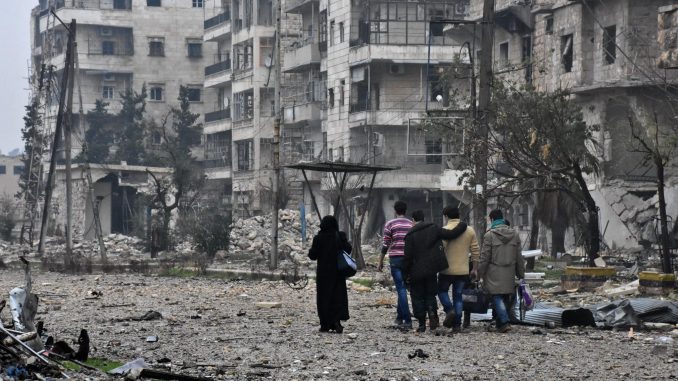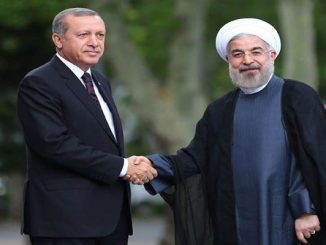
Assad regime announced on Thursday that Aleppo has been fully captured by its forces after the last rebel fighters were evacuated from the city, ending long months of siege, heavy clashes, and humanitarian disaster.
The Assad regime forces, backed by Russian air power, Iranian ground forces and Shi’ite militia fighters from Iran, Iraq, and Lebanon, has been tightening its grip on rebel-held districts of Aleppo since the start of this year.
They have gradually closed in on eastern Aleppo this year, first cutting the most direct lifeline to Turkey before fully encircling the east, encircling 275.000 civilians and launching a major assault in September that killed hundreds of civilians but was blocked by the rebels.
A new offensive was announced on 15 November, in which Assad regime and its allies used the most brutal tactics that the Syrian war witnessed.
The long months of crippling siege, starvation policy, daily bombardment, fierce clashes and bloody massacres ended when the Assad regime and its allies were able to oblige the rebels in Aleppo to surrender and make an agreement to leave the area they have been holding since 2012 after losing more than 90% of it.
More than 1500 civilians were killed and thousands were injured from September until the announcement of the ceasefire, and the residents had lived in great deprivation without functioning hospitals and with little electricity and water in freezing winter conditions.
The ceasefire agreement was a result of talks between Russia and Turkey.
As part of an agreement between Turkey and Russia, tens of thousands of rebels and civilians were supposed to be evacuated from eastern Aleppo to rebel-held Idlib, allowing the Assad regime to take full control of the city after years of fighting.
By taking full control of Aleppo, Assad has proved the power of his military coalition, aided by Russia’s air force and an array of Shi’ite militias backed by Iran after his rule was close to ending after major losses in 2015.
“Massacres are happening and the world is watching” #Aleppo https://t.co/7BG9XJ1LhZ pic.twitter.com/EaiE1y9OkA
— Human Rights Watch (@hrw) December 13, 2016
Last rebels and civilians leave Aleppo
Since last Tuesday, the ceasefire agreement was breached many times and the evacuation of civilians blocked by Iran-backed militias, until it was finally allowed again on Sunday in return to the evacuation of Shiite civilians from areas besieged by the rebels.
The operation was continued on Monday on a wider scale, as thousands of civilians have been evacuated from besieged east Aleppo and thousands more are preparing to leave.
The evacuation of east Aleppo has been completed on Thursday with the last group of rebels and their families holed up in a small enclave in eastern Aleppo was evacuated, whose numbers were about 4000.
Broadcasting live, state media showed footage of a convoy crossing from the Ramousah highway junction in south Aleppo to al-Rashideen in the countryside just southwest of the city.
In parallel, two buses carrying people from the pro-government villages of al-Foua and Kefraya, besieged by rebels in Idlib, arrived in government-held Aleppo, state TV said.
Government forces had insisted the two villages must be included in the deal to bring people out of Aleppo.
The last evacuations bring the total number of people who have left east Aleppo in the last week to a little over 40,000.
Video by @AP show the Rebels and the Civilians of #Aleppo on the road to the west countryside of #Aleppo in the process of evacuation pic.twitter.com/HFAwannUwc
— IRT (@InsRepTeam) December 22, 2016
Those who's been bombed by #Assad and #Russian since years, the #Syrian displacement by Assad sponsored by @UN @UNICEF @hrw pic.twitter.com/JxXZlOGLB9
— Ahmad Alkhatib (@AhmadAlkhtiib) December 13, 2016
Ahmed Qorra Ali, an official with the rebel group Ahrar al-Sham, confirmed “the last convoy has left the rebel-controlled area”.
a senior United Nations official warned that the thousands of evacuees could endure the same situation in their new place of refuge outside the city. Many have gone to the province of Idlib, which is under the control of Islamist rebels and is expected to be the next target of Assad’s campaign.
The UN special envoy for Syria, Staffan de Mistura, said an end to hostilities across Syria was vital if another battle like that for Aleppo was to be avoided.
“Many of them have gone to Idlib, which could be in theory the next Aleppo,” De Mistura said in Geneva.
“All the world remained silent toward the crimes committed by the Russians, Iranians and 60 Shiite sectarian groups by not enabling rebels to obtain the means for defending themselves and their lands,” said Lt. Col. Abu Bakr, a commander of the Jaish al-Mujahideen group that is part of the rebel umbrella Free Syrian Army. “This victory of Russia and Iran’s sectarian militias is over the ruins of a destroyed city.”
No more pictures from #Aleppo, it's controlled by Who killed over than 500k civilians in #Syria pic.twitter.com/ljXXEJ0s1C
— Ahmad Alkhatib (@AhmadAlkhtiib) December 22, 2016
Just a matter of hours & #Aleppo will be occupied by a foreigners.. without its people.. Our routs was instilled there & always will be. pic.twitter.com/qkp78OZuvo
— Zouhir_AlShimale (@ZouhirAlShimale) December 22, 2016
“The victory”
The Assad regime announced the country’s second city Aleppo has been fully recaptured from rebel fighters.
“Thanks to the blood of our heroic martyrs, the heroic deeds and sacrifices of our armed forces and the allied forces, and the steadfastness of our people, the General Command of the Army and the Armed Forces announces the return of security and stability to Aleppo,” said a military statement read by an army general on state television.
The statement said the victory in Aleppo is a “strategic transformation and a turning point in the war on terrorism and a deadly blow to the terrorist project and its supporters”.
It is a further incentive, it added, to go on fighting to “eradicate terrorism and restore security and stability to every span of the homeland”.
The announcement came shortly after state television reported that the last convoy carrying rebels and civilians had left eastern Aleppo.
“The last four buses carrying terrorists and their families arrived in Ramussa”, a district south of Aleppo controlled by government forces, the channel said.
Assad regime officials said that retrieving Aleppo is the biggest victory of them in the crisis, and a major turning point in it.
It puts the government in control of the country’s five main cities: Aleppo, Homs, Hama, Damascus, and Latakia.
“The liberation of Aleppo is not only a victory for Syria but also for those who really contribute to the fight against terrorism, notably Russia and Iran,” state news agency SANA quoted President Assad as saying before the army announcement on Thursday.
He has previously said that: “We are making history by retaking Aleppo from terrorism.”
After meeting a senior Iranian delegation, Assad said his battlefield successes were a “basic step on the road to ending terrorism in the whole of Syria and creating the right circumstances for a solution to end the war”.
Retrieving Aleppo is a victory for his allies too, Russia and Iran, which have outmaneuvered the West and Assad’s regional enemies through direct military intervention.
For Assad regime, taking back Aleppo will help its forces focus on ending the remaining rebels-held areas. These areas include the rebels’ stronghold in Idlib in addition to isolated areas in rural Damascus, Homs, and Hama.
These areas have been under daily bombardment and crippling siege for years. The Old city of Homs and parts of rural Damascus has already been lost to Assad regime, and the remaining areas are expected to follow.
As a conclusion, defeating the rebels and retrieving Aleppo means destroying the last major resistance stronghold of the Syrian rebels and will lead eventually to the victory of Assad regime and ending the Syrian revolution.
The fate of rebel-held Aleppo spells the abject failure of the west’s contradictory and piecemeal policies. It is a humiliation for the UN. Its fall will be an unequivocal victory for Russian strategy, and the shameful and humiliating defeat for all those who said they stand with the civilians and left them to face annihilation including US, Turkey and all Arab states.
Aleppo will join an infamous list of cities whose names are synonymous with mass crimes committed while the world looked impotently on: Srebrenica, Grozny, even Guernica.




